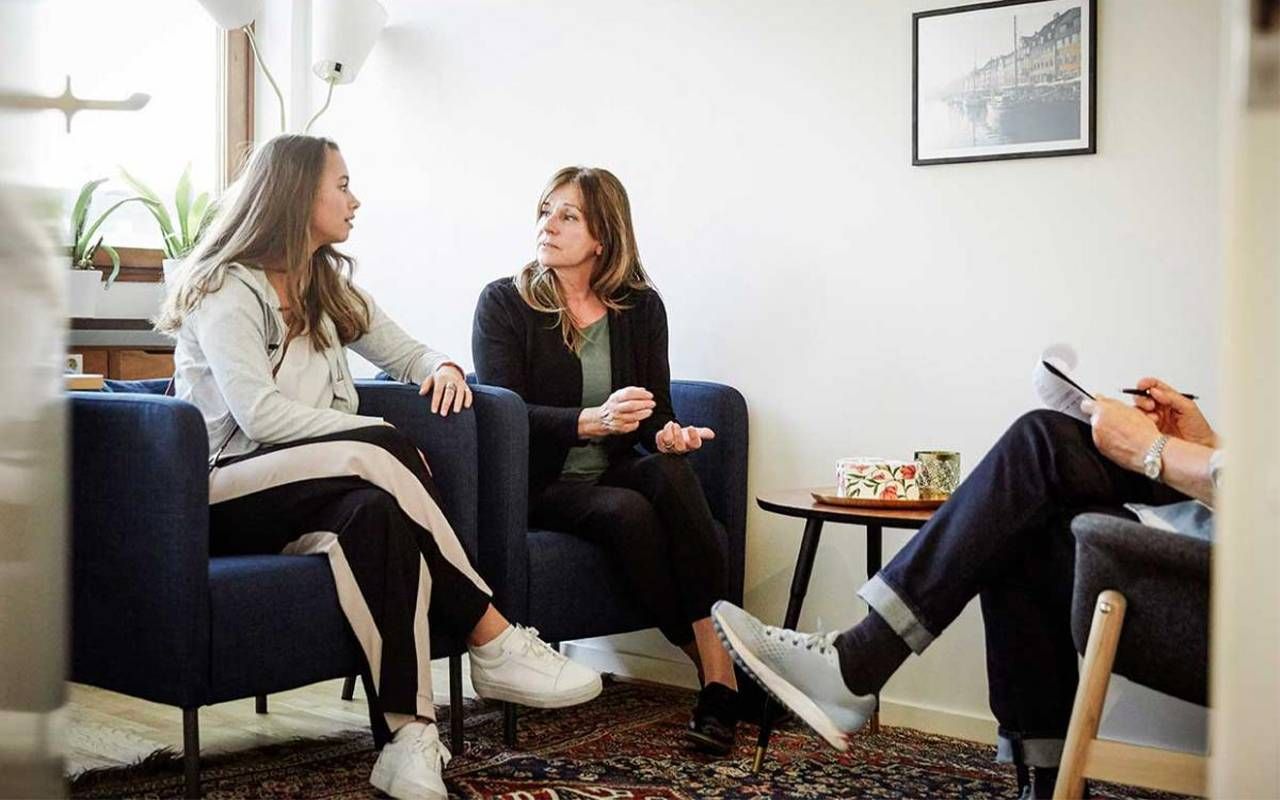Is It Ever Too Late for Family Therapy?
Age really doesn't matter when it comes to improving relationships and fostering healthier family dynamics
On the April 13th episode of her podcast, We Can Do Hard Things with Glennon Doyle, the hosts interviewed actor Julia Louis-Dreyfus. One of the topics Louis-Dreyfus, 62, spoke about was her experience going to therapy with her mother when both were adults.

Louis-Dreyfus explained that her mother had written her a letter in which she expressed her remorse about some things that had happened in the past. Her mother said she wished they could have talked about what happened. Louis-Dreyfus responded, "What's stopping us?"
Therapy can be helpful for families at any age.
The exchange led Louis-Dreyfus, then 60, and her mom, then 87, to go to family therapy together. Louis-Dreyfus said, "It was a wonderful experience. Hard, but ultimately very gratifying, and I feel blessed to have been able to have done that with her."
Most people think of family therapy as something for origin families when children are young and everyone lives under one roof. But as Louis-Dreyfus' experience illustrates, therapy can be helpful for families at any age.
Why Go to Family Therapy as an Adult?
Sarah Epstein, a psychotherapist in Philadelphia and Dallas, says, "Adult family therapy can help families work through old hurts, learn better tools to communicate and navigate each person's boundaries more effectively."
Families can get stuck, fighting over the same issues, unable to find a healthy way to communicate with one another and move forward.
"When families come to therapy, one of the first thing that happens is that everybody gets on the same page about the goals."
"When families come to therapy, one of the first things that happens is that everybody gets on the same page about the goals," explains Epstein.
"The therapist helps everybody stay aligned with those goals and navigates the differing opinions about the relationship so that each family member's needs in the room are met," she says.
Adult therapy can benefit families as they adjust through various stages of life, such as an adult child living at home or introducing a new romantic partner or new child into the family mix.
It can also help adult siblings as they navigate the challenges of the aging parents they share. And therapy with family can help people understand how their upbringing and family dynamics have continued to impact their lives, including their relationships outside of the family.
For family therapy to be most beneficial, both parties must come into it willing to listen to each other's perspectives and be open to changing current behavior.
Dr. Gail Saltz, clinical associate professor of psychiatry at the NY Presbyterian Hospital Weill-Cornell School of Medicine and host of the "How Can I Help?" podcast, says, "Addressing the past isn't about placing blame or punishing someone for what occurred, but about gaining clarity."
Saltz continues, "By understanding what happened and why it happened, family members can hopefully take steps to break bad patterns, let go of resentments and make changes in how they relate to one another."
Therapy Is Different for Adults
Family dynamics are complicated and grown adults tend to act differently with their family of origin. "There is a heavy pull to regress with our family of origin, and this is true for parents and children," explains Saltz.
"It is subconscious, but when an adult child returns home, they feel safe. They may act more childlike and, at first, enjoy that type of attention from the parent. But then they get angry because they feel the parent isn't treating them like another adult," she says.
Conversely, an adult child may feel that they are acting like their adult selves, but their parents or siblings still see them as the petulant child (or a moody teen or pesky little brother) they once were.
Saltz says, "Therapy can help families to adopt healthy adult relationships. It can teach family members mutual respect, what it means to act like adults and treat each other like adults by one another."
Why Parents or Siblings May Be Resistant
Parents love their children. They may see talking about the past as a waste of time (since the past can't be changed) or that their adult child is trying to blame their childhood for their current struggles.
"Parents have built their identity that they were 'good parents' or that they 'did the best they could,'" explains Saltz. "They wear this image and may feel very defensive if an adult child suggests otherwise."
The reality is that even the best parents make mistakes, and no one is perfect. Acknowledgment, by one or both parties that there may have been things you could have done better, or you would do differently, knowing what you know now, can be very healing in the present.
Once everyone agrees to family therapy, find an impartial mental health professional.
Another reason parents may be resistant to seeing a mental health professional is because of generational misconceptions. In today's society, therapy is seen as positive, a way to improve your life and well-being. It is common to discuss going to therapy and mental health struggles.
But thirty or forty years ago, therapy wasn't nearly as openly discussed. Parents were less inclined to discuss issues with their children with mental health professionals, preferring to keep family problems quiet. Going to therapy was perceived as negative, especially by people cautioned not to "air dirty family laundry" to strangers.
Broaching the Idea
Saltz says, "Adult children need to let their family know that they aren't looking to hurt them by suggesting group therapy." It's the opposite. If you are suggesting therapy, it implies you want to improve the relationship and don't want to continue to hurt one another.
When suggesting family therapy, do so at a neutral time and not in the middle of an argument. Saltz says, "Start with a positive such as, 'I know you did the best you could, and you did a lot of things really well. But there are some things I want to talk about in therapy together that I think could make our relationship even better.'"
Getting the Most Out of Family Therapy
Once everyone agrees to family therapy, find an impartial mental health professional. It should be someone new to everyone, not a therapist that one of the parties has already seen. Epstein says, "Family therapy is not simply individual therapy with lots of people in the room. It has its methods that require specialized training."
"Children grow up, parents evolve and change too. Who you were then isn't who you necessarily are now."
Keep an open mind. Resist the urge to correct a family member's version of events. Remember, everyone will have their perspective. Refrain from placing blame and instead be willing to listen.
In the podcast, Louis-Dreyfus discusses how in therapy, both she and her mother were able to discuss their versions of events from the past and acknowledge that they saw things through different lenses then than they did today. According to Saltz, "Children grow up, parents evolve and change too. Who you were then isn't who you necessarily are now."
While discussing past events may be beneficial, therapy shouldn't linger there. "The idea isn't to keep a person 'on the hook' for their misdeeds," says Saltz. "If you say, 'You did X, and that's who you are,' therapy won't be productive. Instead, there needs to be a willingness to forgive and a desire to make changes in the future."
Risks of Family Therapy
Family therapy does have potential risks. Delving into the past can cause people to get upset and can sometimes lead to more hurt than resolution. It's important to remember the overall goals rather than trying to "win" an argument.
Sometimes, the relationship may be toxic, and discontinuing joint therapy may be necessary (although some people may want to continue working solo to improve their lives). And in some families, estrangement or limited contact is the healthiest solution for one or both parties.
Remember that more than just going to therapy is needed to solve problems. "Participation, hard work, and, many times, some misery are all part of improving relationships," Saltz says.
Such was the case for Louis-Dreyfus and her mother. After going to therapy, she and her mother wondered why they hadn't gone together sooner. "It's a great resource if one has access to it," says Louis-Dreyfus.


